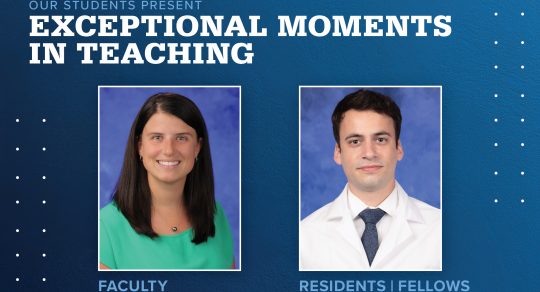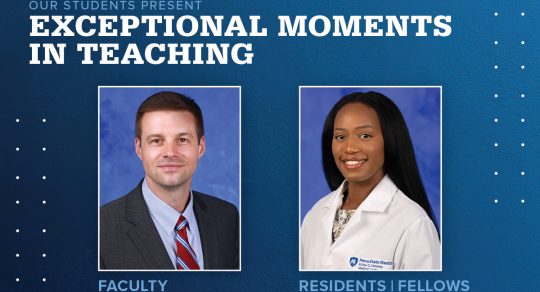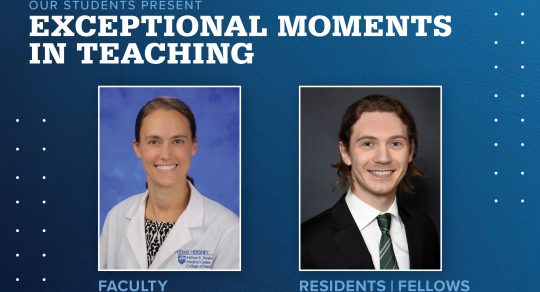Fellowship
Minimally Invasive and Bariatric Surgery
The Minimally Invasive and Bariatric Surgery Fellowship at Penn State Health Milton S. Hershey Medical Center is a one-year, fully funded, non-ACGME-accredited program that admits one fellow per year under accreditation by the Fellowship Council.
Explore More
The Minimally Invasive and Bariatric Surgery Fellowship is primarily a clinical fellowship with a broad mix of surgical cases including general and bariatric surgery. For the large majority of cases, the fellow is the operating surgeon and the attending is the assistant. The fellow is appointed as an instructor within the Department of Surgery.

Program Overview
Clinical responsibilities include all aspects of care of the MIS or bariatric patient from initial clinic visit to post-operative visits. The operative experience includes: foregut surgery including antireflux procedures; Heller myotomy and paraesophageal hernia repair; weight loss surgery, including Roux-en-Y gastric bypass, sleeve gastrectomy, revisional surgery and adjustable gastric banding; bowel resection; solid organ surgery such as splenectomy, adrenalectomy and living-donor nephrectomy; hernia surgery, including groin, ventral and incisional; robotic surgery; and surgical endoscopy.
The fellowship includes involvement in educational and research programs. Faculty interests in these areas include surgical simulation, NOTES, surgical education and clinical outcomes. It is expected that the fellows will participate in, present and publish results of this research. Teaching responsibilities include demonstration of MIS techniques to all levels of medical students and surgical residents.
The department has done its best to preserve the “general” nature of the fellowship in order to give fellows a broad experience in minimally invasive surgery. The program continues to provide experience in advanced upper GI surgery, weight-loss surgery and solid organ surgery, and has added a tremendous experience in surgical endoscopy such as ERCP and interventional procedures for bariatric complications. The opportunities for research and educational activities are exceptional. There are vibrant programs in the areas of device development, NOTES and simulation. The program is what each trainee makes of it and can be a period of substantial growth toward an academic or general surgery career.
The program has a three-year accreditation from the Fellowship Council and is fully funded for two fellows by the Foundation for Surgical Fellowships.
The Minimally Invasive and Bariatric Surgery Fellowship is salaried, with salary guaranteed for the one-year duration of the position, which runs from July 1 to June 30.
Funding is available beyond the salary for meeting attendance, research, etc. There are call responsibilities and teaching responsibilities, as well as required courses and academic presentations. Reimbursement for the above does not make up part of the salary.
Approximately 90 percent of the fellow’s time is spent in clinical activity, with the remaining 10 percent of time spent on research activity.
Facilities include a dry lab, as well as a Clinical Simulation Center. Penn State Health Milton S. Hershey Medical Center is an ACS-accredited education institution and a certified FLS testing center with four certified examiners on staff.
Learn More about the Fellowship
How to Apply
Fellows must have completed an ACGME-approved general surgery residency program or be fully trained surgeons eligible for unrestricted licensure to practice medicine in the Commonwealth of Pennsylvania.
The physicians entering into the fellowship are hired as faculty, not residents. Because of this, they must be U.S. citizens or hold H1B visas, O1 visas or green cards. In order to participate in the fellowship program, the fellow needs to obtain an unrestricted Pennsylvania license (MD license) and a federal DEA license.
Applications should be submitted online through the Fellowship Council. No curriculum vitae or applicants will be accepted outside of the Fellowship Council website.
Why the Fellowship Council?
More than 70 percent of graduating surgery residents feel the need for postgraduate fellowship training, and the advanced GI programs represented by the Fellowship Council offer a high-quality education experience. The Fellowship Council was created to foster the development of high-quality fellowships in MIS, GI, flexible endoscopy, bariatric and hepatobiliary/pancreatic surgery.
The Fellowship Council has created stringent guidelines for the optimal education experience and implemented an accreditation process to ensure that programs live up to these high aspirations.
The Fellowship Council represents 130 programs, approximately 90 percent of the postgraduate training programs in advanced GI surgery in North America. The Fellowship Council has close ties with the leading surgical specialty societies, including SAGES, SSAT, AHBPA and ASMBS. The Council is a member of the American Board of Surgery’s sub-board of GI Surgery and is actively drafting training curricula in specialties for general surgical residency training.
Application Deadlines
Deadlines for the opening and closing of applications are set by the Fellowship Council, but in general, the application process opens July 1 and closes Sept. 1.
As part of the Fellowship Council, Penn State Health participates in the National Resident Matching Program (NRMP) Match process.
Once the application on the Fellowship Council website is closed, applicants need to register with the NRMP. The NRMP’s Specialties Matching Service conducts matches for advanced residency or fellowship positions.
State Licensure Requirements
Applicants may view the state licensing application for graduates of unaccredited medical schools as well as the application for graduates of accredited medical schools on the Pennsylvania State Board of Medicine website
With questions regarding these forms or the items required, applicants should call the State Board of Medicine directly at 717-783-1400 and select option 3 to speak to a specialist.
Information regarding application for a DEA license is available on the DEA website.
Leadership

Professor and Vice Chair for Technology, Surgery

Professor and Vice Chair for Faculty Development, Surgery
Program Coordinator, Minimally Invasive and Bariatric Surgery Fellowship and Hernia and Abdominal Wall Fellowship, Surgery



